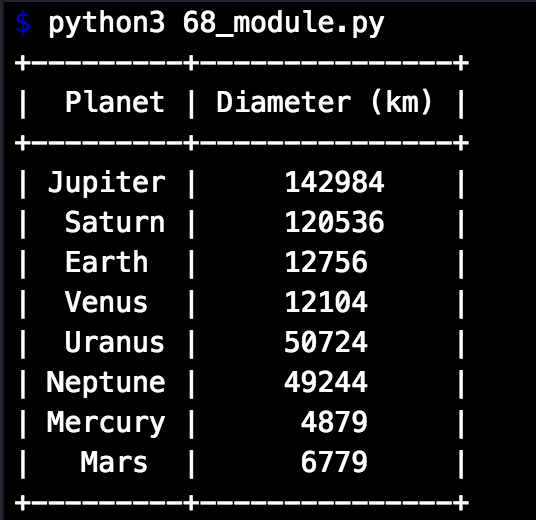class Customer:
#global limit = -1000
def __init__(self):
#in a real app these values would be provided most likely by a database
self.balance = 0
self.limit = -1000
self.security_check = True
self.is_active = True
def credit_limit(self, balance):
#limit = -1000
if balance < self.limit:
return False
else:
return True
def withdraw(self, amount):
#act_balance = self.balance - amount
self.balance -= amount
if (self.credit_limit(self.balance) == True):
return self.balance
else:
return ("Withdrawl not possible. You reached the credit limit.")
def deposit(self, amount):
self.balance += amount
return self.balance
a = Customer()
b = Customer()
print(a.withdraw(500)) # - 500
print(a.deposit(100)) # - 400
print(b.withdraw(1500)) # Withdrawl not possible. You reached the credit limit.Monat: März 2018
Day 69: Make Good Looking Tables With PrettyTable (Module)
Scripts running in the shell are pretty cool. But sometime you want to display tables that have no real format.
The module PrettyTable generates some – well pretty – tables with just a couple of lines.
The script takes a dictionary with the sizes of all planets in the solar system.
It exports it in a PrettyTable in descending order.
# PrettyTable module
# Create handsome tables in your shell
from prettytable import PrettyTable
planets = {"Mercury" : "4879",
"Venus" : "12104",
"Earth" : "12756",
"Mars" : "6779",
"Jupiter" : " 142984",
"Saturn" : "120536",
"Uranus" : "50724",
"Neptune" : "49244"
}
# create the table with two colums
size_table = PrettyTable(["Planet", "Diameter (km)"])
# go over every planet in dict and add a row for each
for item in planets:
size_table.add_row([item, planets[str(item)]])
# sort planets from big to small
size_table.sort = True
print(size_table)The output looks like this:
Day 67: Read A Binary File
Day 66: Being A Scribe – Read From And Write To Files
# Read and write files
# open the file with 'write'-mode
test_file = open("files_test.txt", "r")
# full list of file modes
# "w" - write text file (overwrite possible)
# "r" - read text file
# 'x' - write text file (includes error is file exists)
# 'a' - append to end of file
# 'rb' - read binary files
# 'wb' - write binary
# 'w+b' - read and write binary file
# 'xb' - write binary file (includes error is file exists)
# 'ab' - append to end of binary file
# Read files
print(test_file.read()) # This is a test - full text
# Read one line
print(test_file.readline()) # This is a test - one line
# iterate over text files
for line in test_file:
print(line) # This is a test - all lines
# readline() is not very well suited to iterate over big files
# close files - you should alway close a file after using it!!!
test_file.close()
# Write to files
texty = open("files_test.txt", 'w')
texty.write("11 This is a test\n")
print(texty.read())
texty.close()Day 64: Check If A String is a Palindrome With Python
We get a string and check if it is a palindrome:
# Find out if a word is a palindrome
def palin(word):
''' take word, build inverted string
and check if it is a palindrome '''
word = word.replace(".", "") # get rid of eventual "."
word = word.lower() # make lowercase
length = len(word)
new = list("") # build an empty list for the inversed string
index = -1 # -1 so we start building in reverse order
# take every letter and add it to new list in reverse order
for i in word:
new.insert(index, i)
index -= 1
# change list to string
new_str = "".join(new)
# get rid of any spaces in a sentence
word_stripped = word.replace(" ", "")
new_stripped = new_str.replace(" ", "")
# check if word and the reverse string are the same
if (word_stripped == new_stripped):
return (word + ": This is a palindrome")
else:
return (word + ": This is NOT a palindrome")
print(palin("Anna")) # anna: This is a palindrome
print(palin("peter")) # peter: This is NOT a palindrome
print(palin("Name not one man.")) # name not one man: This is a palindromeDay 63: Indexing And Slicing
# Indexing
# note: sets can't be indexed
my_guitars = ["Gibson Les Paul", "Ibanez RG", "Fender Stratocaster"]
print(my_guitars[0]) # Gibson Les Paul
# Python allows negative indexing. -1 returns the last item aso
print(my_guitars[-1]) # Fender Stratocaster
print(my_guitars[-2]) # Ibanez RG
# indexing a tuple
print(("Marshall", "Laney", "Orange")[1]) # Laney
# indexing a string
print("Wampler"[3]) # p - index starts at 0
# slicing
print(my_guitars[0:2]) # ['Gibson Les Paul', 'Ibanez RG']
# note: the first index is optional. negative indexing works here as well
print(my_guitars[:2]) # ['Gibson Les Paul', 'Ibanez RG']
print(my_guitars[:-1]) # ['Gibson Les Paul', 'Ibanez RG']
#Examples
# get first and last letter
name = "Robert"
print(name[0]) # R
print(name[-1]) # t
# delete the file extension
filename = "document.txt"
print(filename[0:-4]) # documentDay 61: Functions Overview
# Functions
# declaring a Function
# if there is no return in the Functions
# python will return the last command line
def func(para1, para2):
''' explain what happens here '''
sum = para1 + para2 # variables declared inside functions are local
return sum
#calling a function
sum = func(13,5) # 18 this sum is not related to the sum-variable in the function
print(sum)
#using default parameters
def def_func(x, y=3): # y=3 is a default parameter
return x + y
print(def_func(2)) # 5 - the function will use the default parameter
print(def_func(5,8)) # 13 - default parameters can be overwritten
# Examples:
def is_odd(num):
''' returns true if number is odd '''
if (num % 2 == 0):
return True
else:
return False
print(is_odd(4)) # True
def is_prime(x):
''' checks if number is prime '''
''' only natural number bigger 1 can be considered primes '''
if (x > 1):
return all(x % i for i in range(2, x))
else:
return False # if number is 1 or less
print(is_prime(3)) # True

